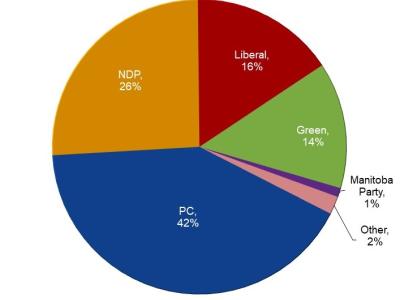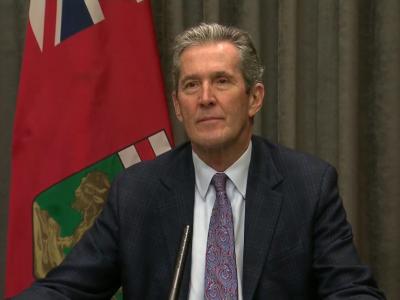The federal Conservatives now enjoy significant momentum with voters in Manitoba. Conservative support in the Keystone Province has reached heights not seen since the party was in power nearly a decade ago, a new Probe Research survey for the Winnipeg Free Press finds.
Today, support for Pierre Poilievre and the Conservatives province-wide sits at 47 per cent – eight points higher than the party’s result in the 2021 federal election and two points higher than it received in 2019. The federal NDP, under Jagmeet Singh, has edged past Prime Minister Justin Trudeau’s Liberals into second place, with the NDP currently sitting at 26 per cent (+3% vs. the 2021 election) and the Liberals at 23 per cent (-5%). Support for the Green Party (2%, no change vs. 2021) and other parties (1%, -7%) is negligible, in part because support for the People’s Party of Canada (PPC) appears to have drifted to the Conservatives. Sixteen per cent of those surveyed are undecided in terms of federal party choice.
Although the Liberals are in a much weaker position than they were in 2021, the one silver lining for them is that the Conservatives have not grown their support in Winnipeg. The Liberals remain somewhat competitive in key areas of the city. Today, 38 per cent of Winnipeg voters prefer the Conservatives, which is the result the party posted in the 2021 election. The NDP is now up to 31 per cent support (+4%), while the Liberals remain at 28 per cent (-1%). The Liberals are also statistically tied with the NDP in inner suburban neighbourhoods that overlap with Liberal seats in south Winnipeg. In outer suburban communities, however, the Conservatives have a commanding lead over the two parties currently governing Canada through a confidence and supply agreement.
Outside Winnipeg, Conservative support has rebounded to the level it achieved in the 2019 election (61%), with those who voted PPC in 2021 no longer preferring this party. Support for the NDP (19%) and the Liberals (16%) is virtually unchanged from the 2021 election in rural Manitoba, as both parties trail the Conservative to a significant degree.
Conservative support is notably high among men, who are three times as likely to prefer the Tories to the federal NDP or Liberals. The three parties are statistically tied for support among women.
Younger adults aged 18-34 have abandoned the federal Liberals in a major way. Two in five prefer either the Conservatives or NDP, and fewer than one in five would vote for the Liberals today. Conservative support also rises among older voters and those who do not have a university degree.
Interestingly, one-third of those who voted for the provincial NDP in the 2023 Manitoba election would vote for a federal Liberal candidate in their riding – and more than one in ten would vote for a federal Conservative. Only about half of those who voted for Premier Wab Kinew’s provincial NDP would also cast a ballot for its federal counterpart. This stands in contrast to those who backed the provincial Progressive Conservatives (PCs), where nine in ten 2023 PC voters would cast a cross-over ballot for the federal Conservatives.
About the Probe Research Omnibus
For more than two decades, Probe Research has undertaken quarterly omnibus surveys of random and representative samples of Manitoba adults. These scientific telephone surveys have provided strategic and proprietary insights to hundreds of public, private and not-for-profit clients on a range of social, cultural and public policy topics. The Probe Research Omnibus Survey is the province’s largest and most trusted general population survey.
Disclosure Statement
Probe Research is a member of the Canadian Research Insights Council (CRIC) and confirms that this research fully complies with all CRIC Standards including the CRIC Public Opinion Research Standards and Disclosure Requirements. Learn more at: https://www.canadianresearchinsightscouncil.ca/standards/por/
Methodology
Probe Research surveyed a random and representative sampling of 1,000 adults residing in Manitoba between March 5 and 18, 2024.
With a sample of 1,000, one can say with 95 per cent certainty that the results are within ± 3.1 percentage points of what they would have been if the entire adult population of Manitoba had been surveyed. The margin of error is higher within each of the survey’s population sub-groups.
The sample consists of 493 Manitobans randomly recruited via live-agent operator, 288 randomly recruited via Interactive Voice Response (IVR) and 219 members of Probe Research’s online panel. All respondents completed the survey on an online platform.
Modified random digit dialing, including both landline and wireless numbers, ensured all Manitoba adults had an equal opportunity to participate in this Probe Research survey.
Minor statistical weighting has been applied to this sample so that age, gender and regional characteristics properly reflect the province’s population. All data analysis was performed using SPSS statistical analysis software.




